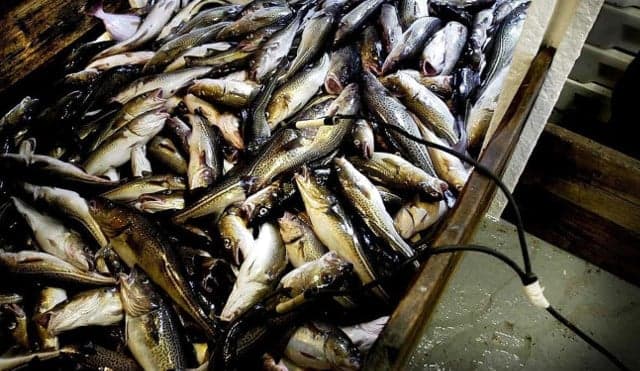Don't eat Baltic cod, WWF warns

Ten species of fish native to the Baltic Sea are in a critical situation, with cod in particular worsening, according to the World Wildlife Fund (WWF).
The WWF's 2018 Fish Guide looks in detail at the sustainability situation of fish consumed in 25 countries including Sweden, using a green-amber-red scale (from best to worst) to grade them. Of the Baltic fish, only eastern herring, yarn-caught perch from the Gulf of Riga and Marine Stewardship Council (MSC) certified sprat from Latvia were given the green light by the charity.
The WWF's methodology assesses the species based on how stocks are, how effective stock management is, and the impact of the fish (and by extension, removing it) on its ecosystem.
Several popular species from the Baltic including cod, salmon, pike, and turbot are given red-light status for 2018, while trawled cod from the eastern Baltic joining that group is particularly bad news according to the WWF.
"That means that all Baltic cod now has a red light in the WWF's Fish Guide – with the appeal to not eat it. That's both sad and upsetting, and shows that management isn't working. When large predatory fish like cod disappears it risks changing the entire ecosystem," WWF senior sea and fish expert Inger Näslund said in a statement.
READ ALSO: Meat consumption in Sweden drops by record amount
The situation for some types of herring has also worsened – with stock from west of the Danish island Bornholm dropping from green to amber – as has that of turbot which dropped from an amber to red light. Difficulties in assessing the quantities and a lack of information about catches are behind those changes.
It's not all bad news however. MSC and KRAV certified coldwater prawns caught off Sweden's west coast continue to have a green light, while witch flounder caught in the Skagerrak and Kattegat straits west of Sweden have gone from a red to amber light.
The charity urged politicians to do more in order to ensure locally caught fish is available in the future, including tighter controls to allow stocks to recover.
Swedes now eat fish around 1.4 times per week, and around 11kg of seafood per person each year, requiring 25kg of whole fish and shellfish, per the WWF.
READ ALSO: Sweden's consumption footprint 'among the worst', WWF says
Comments
See Also
The WWF's 2018 Fish Guide looks in detail at the sustainability situation of fish consumed in 25 countries including Sweden, using a green-amber-red scale (from best to worst) to grade them. Of the Baltic fish, only eastern herring, yarn-caught perch from the Gulf of Riga and Marine Stewardship Council (MSC) certified sprat from Latvia were given the green light by the charity.
The WWF's methodology assesses the species based on how stocks are, how effective stock management is, and the impact of the fish (and by extension, removing it) on its ecosystem.
Several popular species from the Baltic including cod, salmon, pike, and turbot are given red-light status for 2018, while trawled cod from the eastern Baltic joining that group is particularly bad news according to the WWF.
"That means that all Baltic cod now has a red light in the WWF's Fish Guide – with the appeal to not eat it. That's both sad and upsetting, and shows that management isn't working. When large predatory fish like cod disappears it risks changing the entire ecosystem," WWF senior sea and fish expert Inger Näslund said in a statement.
READ ALSO: Meat consumption in Sweden drops by record amount
The situation for some types of herring has also worsened – with stock from west of the Danish island Bornholm dropping from green to amber – as has that of turbot which dropped from an amber to red light. Difficulties in assessing the quantities and a lack of information about catches are behind those changes.
It's not all bad news however. MSC and KRAV certified coldwater prawns caught off Sweden's west coast continue to have a green light, while witch flounder caught in the Skagerrak and Kattegat straits west of Sweden have gone from a red to amber light.
The charity urged politicians to do more in order to ensure locally caught fish is available in the future, including tighter controls to allow stocks to recover.
Swedes now eat fish around 1.4 times per week, and around 11kg of seafood per person each year, requiring 25kg of whole fish and shellfish, per the WWF.
READ ALSO: Sweden's consumption footprint 'among the worst', WWF says
Join the conversation in our comments section below. Share your own views and experience and if you have a question or suggestion for our journalists then email us at [email protected].
Please keep comments civil, constructive and on topic – and make sure to read our terms of use before getting involved.
Please log in here to leave a comment.